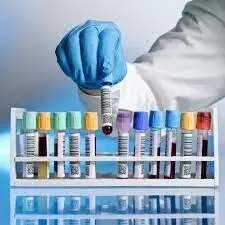Why Hormone Testing is Important for Male Fertility?
image for illustrative purpose

The hormonal system is very crucial in male fertility. Hormonal balance and adequate levels help with the normal erection and ejaculatory function in men. A deficiency in any of the sex hormones, such as FSH (follicle-stimulating hormone), GnRH (gonadotropin-releasing hormone), LH (luteinising hormone), etc., can lead to significant problems with sperm production and quality.
In the following article, you’ll learn how different male hormones impact male fertility, signs of hormonal imbalance, and foods, such as eggs or supplements like fish oil capsules, protein bars, and peanut butter, to improve testosterone levels.
Male Hormones and Their Relationship with Fertility
One example of a fertility-related hormone in men is GnRH, which triggers the pituitary gland and controls other hormones' secretion. At the same time, the pituitary gland produces FSH, commonly known as follicle-stimulating hormone, which helps with testicular growth and stimulates the testicles to produce sperm. The pituitary gland also secretes LH, a luteinising hormone, responsible for testicular growth and testosterone production, which is needed in high levels to stimulate adequate sperm production.
Research Says
Deficient levels of testosterone (<300ng/dL) are related to decreased sperm count in 44.6% of men.
So, a vast interplay of different organs and hormonal glands has increased and decreased men’s fertility. An imbalance in them can result in disturbed energy levels and several physio-psychological symptoms.
Signs of Hormonal Imbalance in Males
Here are some of the most noticeable signs of an imbalance in male hormones:
Erectile dysfunction
Decreased sex drive
Fatigue
Depression
Decreased bone density
Difficulty achieving orgasm
Decreased ejaculate volume
Belly fat
Decreased muscle mass.
You can opt for various clinical tests if you are having these symptoms and suspect an imbalance in your hormonal level.
Diagnostic Tests for Male Hormone Levels
Any man with symptoms of low testosterone should have the following four hormone tests:
1. Total testosterone
2. Estradiol
3. Follicle stimulating hormone (FSH)
4. Luteinising hormone (LH)
5. Thyroid-stimulating hormone (TSH)
6. Inhibin B.
7. Prolactin.
Timings of Hormone Testing Matters
Most hormonal testing, including estradiol, FSH, LH, TSH, and prolactin, can be done at any time of day, but blood for testosterone levels and inhibin B should be drawn between 7:00 a.m and 10:00 a.m. as this is the time of day that most men have their peak blood levels of testosterone.
Men who work at night consistently and are never awake during early morning hours can have their testosterone levels drawn at their usual wake-up times. It would be ideal to have testosterone levels drawn between 7:00 a.m. and 10:00 a.m. after being off work for men with irregular night employment. Fasting is not necessary to obtain routine fertility hormone testing.
Foods to Boost Testosterone Levels
Men can boost fertility by increasing their testosterone levels. Here are some foods that can boost its levels:
Fish Oil: It is rich in fatty acids like omega-3 that help improve good cholesterol levels in the body. You can consume fish dishes or take omega three tablets and capsules. You may also get healthy fatty acids from peanut butter.
Multivitamins: Vitamin C is known to improve sperm count and motility while vitamin E helps increase the fertilisation rate in men. Vitamin D is linked with improved testosterone levels. You can consume fresh fruits, vegetables, and dairy products to manage these vitamins.
Amino Acids: As a building block of new cells, amino acids are highly important for new cell production and reproductive health. They are found in protein that you can obtain by consuming yoghurt, salmon, poultry, eggs, etc. You may also take protein powder or bars to increase your protein intake.
To Sum Up
Men’s fertility is dependent on different types of hormones that manage sperm count, energy levels, testicular development, libido, etc. Imbalance in these can impact energy, mood, physical health, and fertility. You can opt for tests that check the levels of testosterone, LH, FSH, prolactin, etc., to get a detailed report of your hormone levels.
Make sure to inform the doctor about your lifestyle so that you can select a suitable time for blood tests for better results. Last but not least, take a balanced diet rich in amino acids, vitamins, and healthy fatty acids to improve your hormone levels.

